12 People Whose Medical Visits Went Horribly, Horribly Wrong

“In space, no one can hear you scream.” We know that no supernovas, crashing asteroids, and burning planets make a sound in space. Or do they? What if you actually CAN hear something out there? Well, let’s see!
Okie-dokie, back to middle school. “Sound is a mechanical wave originating from vibration.” Umm... what exactly does that mean? The simplest example is guitar strings. Let’s pull one of them. It starts to vibrate. The atoms inside the metal string begin to push and beat the atoms of the air around them.
So, now, atoms are constantly pushing each other — until they reach our ears. It’s like a wave from a pebble thrown into a pond. And it happens very quickly — at a speed of about 0.21 mi/s!
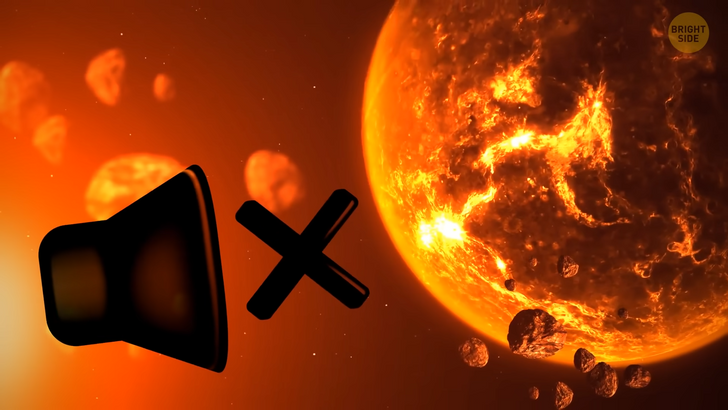
Then our eardrums begin to vibrate at the same frequency. And little bones inside our ears transmit this vibration to the brain. The brain then does its magic, recognizes the pattern, and turns it into sounds.
Great! Now we know that we need some particles to create sound. And we can find these particles in gases, liquids, and solid substances.
And what about space? Nope! It’s an almost perfect vacuum. And you’ve probably already heard that “there’s no sound in space because it’s a vacuum.” But what does it actually mean? A vacuum is a “perfect void.” It’s an area completely devoid of matter. It means there’s nothing there. Yeah! Despite all those celestial bodies in space, there’s actually no air between them, no atoms or particles... Nothing. At. All. Well, almost. To be honest, the “perfect vacuum” doesn’t really exist. We can’t get rid of atoms for good. But space is very close to this notion: on average, there are 15-80 atoms per 1 cubic inch.
This may sound like a big number, but keep in mind that these atoms are TINY. And the void distance between them is HUGE. For comparison, 1 cubic inch of air contains about 16,000 atoms!
So, of course, with such a low density, these atoms can’t push each other. Even if the vibration is very strong — like, I don’t know, a supernova — they still won’t be able to do that.
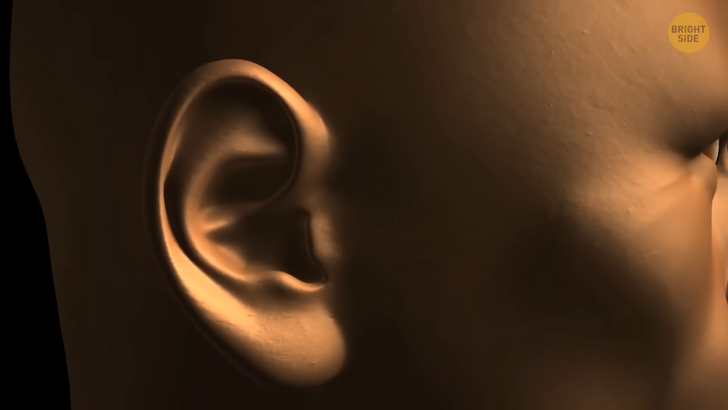
Oh no, movies have been lying to us! All these epic space scenes actually take place in an awkward silence! Who would’ve guessed? But don’t get upset! What if I tell you that there are, in fact, some ways to hear sound in space?
First of all, there’s still sound on other planets. If there’s an atmosphere on a space body — or at least something like gas, water, or a solid surface — there will be sound. In our case, the atmosphere becomes completely silent at about 60 miles above Earth’s surface. That’s where the sky stops being blue, and a black starry veil begins.
In any case, we’d have to land on another planet or at least get close to its atmosphere to hear something. But whatever it is, it’d sound very different. Let’s take our favorite Venus as an example. The atmosphere there is VERY dense — scientists jokingly call it “thick chemical soup.”
So if you somehow managed to stay alive and speak there, your voice would be VERY different. It’d become much louder, and it’d sound deeper. So, if you want a pleasant baritone, you know what to do.
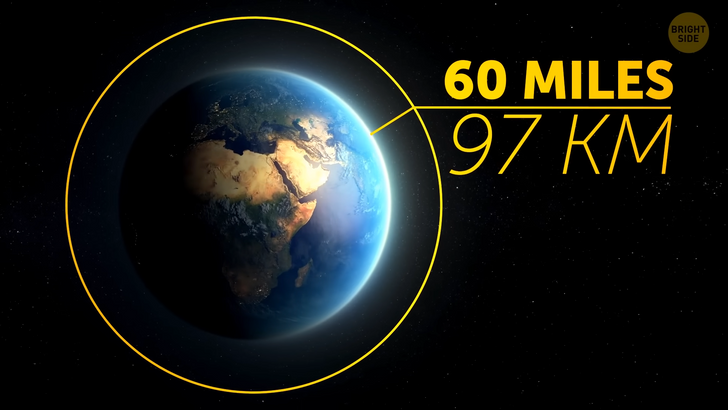
I wonder what would happen if Earth had a denser atmosphere? What would we hear then? Well, you can vaguely imagine that if you’ve ever been in the water. Water is very dense. Sound moves there much faster and better compared to the air — at a speed of almost a mile per second! If you sit in an empty room with no sound sources, you won’t hear much, right? Now, dip your head in the water and check out how the same “silence” sounds here. It’s not quiet at all!
Even if you ignore the ever-present sounds of the water itself, you’ll immediately notice how well you can hear your own body. How your blood pulsates in the veins, how the heart beats, the slightest movement of your fingers. Kinda creepy, isn’t it?
This gives us an idea of what would happen to us on a planet with a denser atmosphere. And that’s just crazy — we would hear EVERYTHING. From scurrying animals to the movement of tectonic plates!
“Oh, come on,” you’d probably say. “It’s obvious that there’s sound on other planets. But didn’t you say that we can hear something in open space?” Actually, yes! For example, in a cloud of dust! You can find space dust almost everywhere in space. It may be the remains of a star or something else. And in these places, everything is a bit denser than usual.

This means there are probably dust clouds where particles are very close to each other — which means they can produce sounds! Of course, those will be very quiet and transmitted over a very short distance. But it’s better than nothing, right?
Plus, we already have one real space sound recorded! It came from the Perseus galaxy, which is located 250 million light-years away from us. NASA recorded it in 2003. Those of us music geeks will want to know that it’s a B-flat, 57 octaves below C on the piano. You’d have to add another 6,600 keys to the left on the keyboard. But its frequency is so low that the human ear, unfortunately, can’t hear it.
But besides that, we can only hear something inside spaceships. These are small “pockets of air,” after all. In a spacesuit, you’d hear sounds VERY well, too — including your breathing or blood circulation in a spacesuit. But two astronauts, flying side by side, wouldn’t hear each other — even if they got very close and shouted very loudly. It’s quite funny — if you, being an astronaut, bumped into something, it would be very loud for you, but your friend wouldn’t hear anything. That’s why astronauts use radio devices.
Now, purely theoretically, if you could somehow crawl out of your spacesuit and survive, you’d be able to hear the chatter and noises going on inside the spaceship! But how?
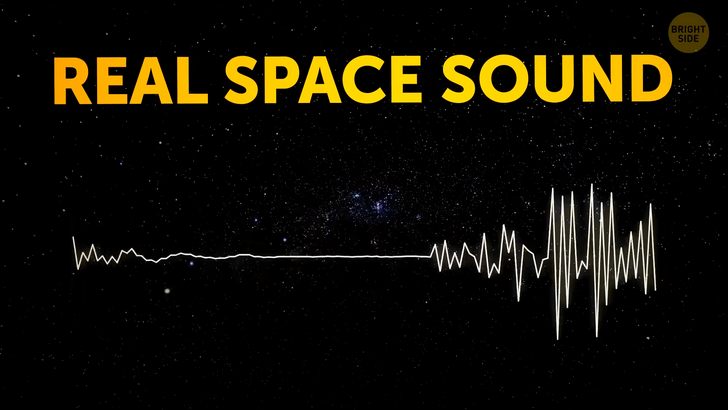
Look, we have some air inside the ship, and it transmits sound. It reaches the metal casing and gets through it. And then, if you leaned against the ship, preferably touching it with your elbow or knee, the sound would be transmitted to the brain DIRECTLY through your bones, ignoring the ears!
Yes, our bones conduct sound! That’s how, for example, deaf people listen to music. It’s called “bone conduction.” It’s used in some headphones and other technologies.
You can do a little experiment. Hold your fingers over your ears. Shut them properly so that you really don’t hear much. Then try to touch a sound source — it can be anything vibrating, for example, a speaker playing music — with some part of your body where the bone is close to the skin.
Now, watch the miracle happen. You can hear the sound not through your ears but directly in your brain! But, please, don’t repeat this experiment in open space! Now, you’ve probably heard about things like “The Sounds of Space,” where you can listen, for example, to the sounds made by the Sun or different planets. How do we record these ones?
Easily! This is another way to hear sound in space — electromagnetic waves. In other words, a radio! Radio is the same form of electromagnetic radiation as light. These waves can travel in a vacuum without any problems. Astronauts’ transmitters work that way.
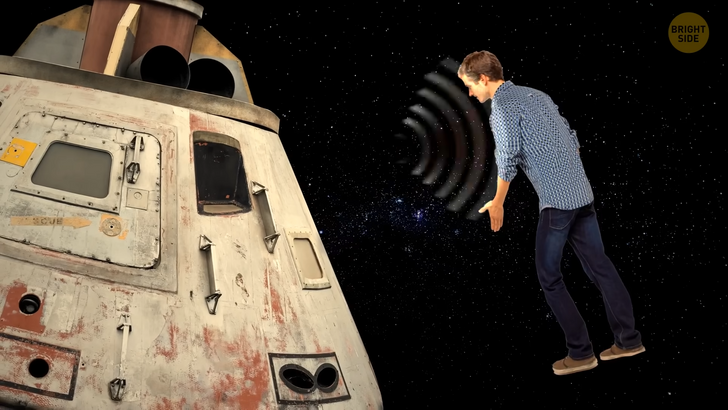
An astronaut says something to their friend. The sound waves turn into radio waves, reach the other person, and are then converted back to sounds.
And this is how we get so-called “space sounds.” Our planet is actually very loud in that regard. We’re sending a huge amount of radio waves into the Universe — all radio signals we’ve ever listened to. It’s a pity that they travel only 110 light-years away from us.
But you know, I think it’s good we don’t hear everything that happens in space. Imagine if sound could easily travel through the Universe? We would hear EVERYTHING, from solar flares to nearby supernovas! Horrifying, right? So, maybe we’re just lucky.











